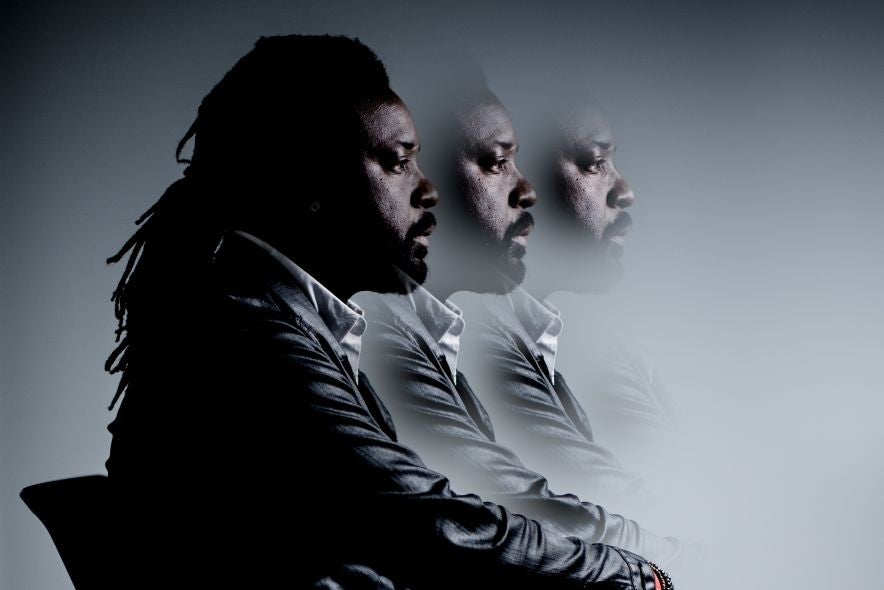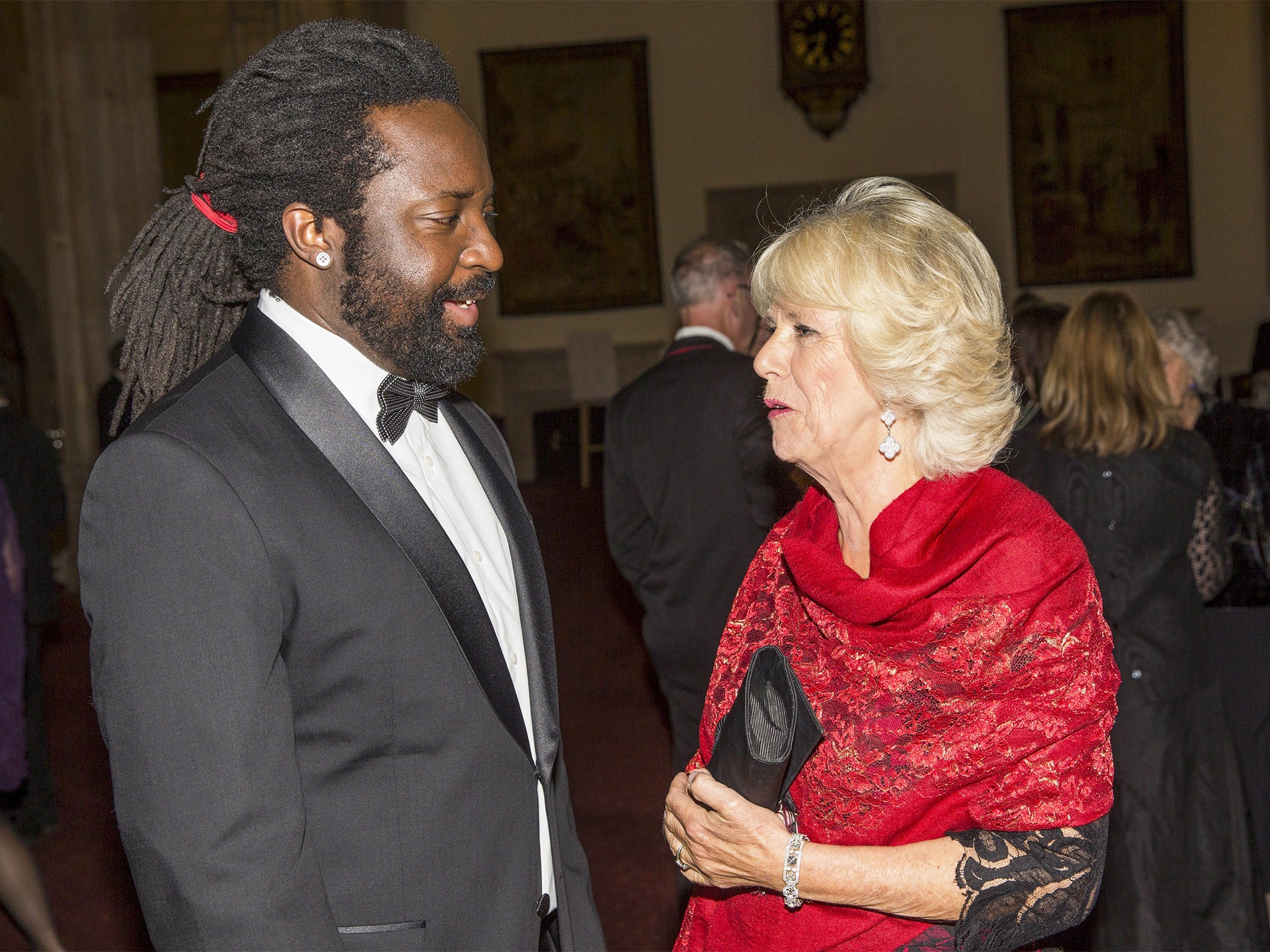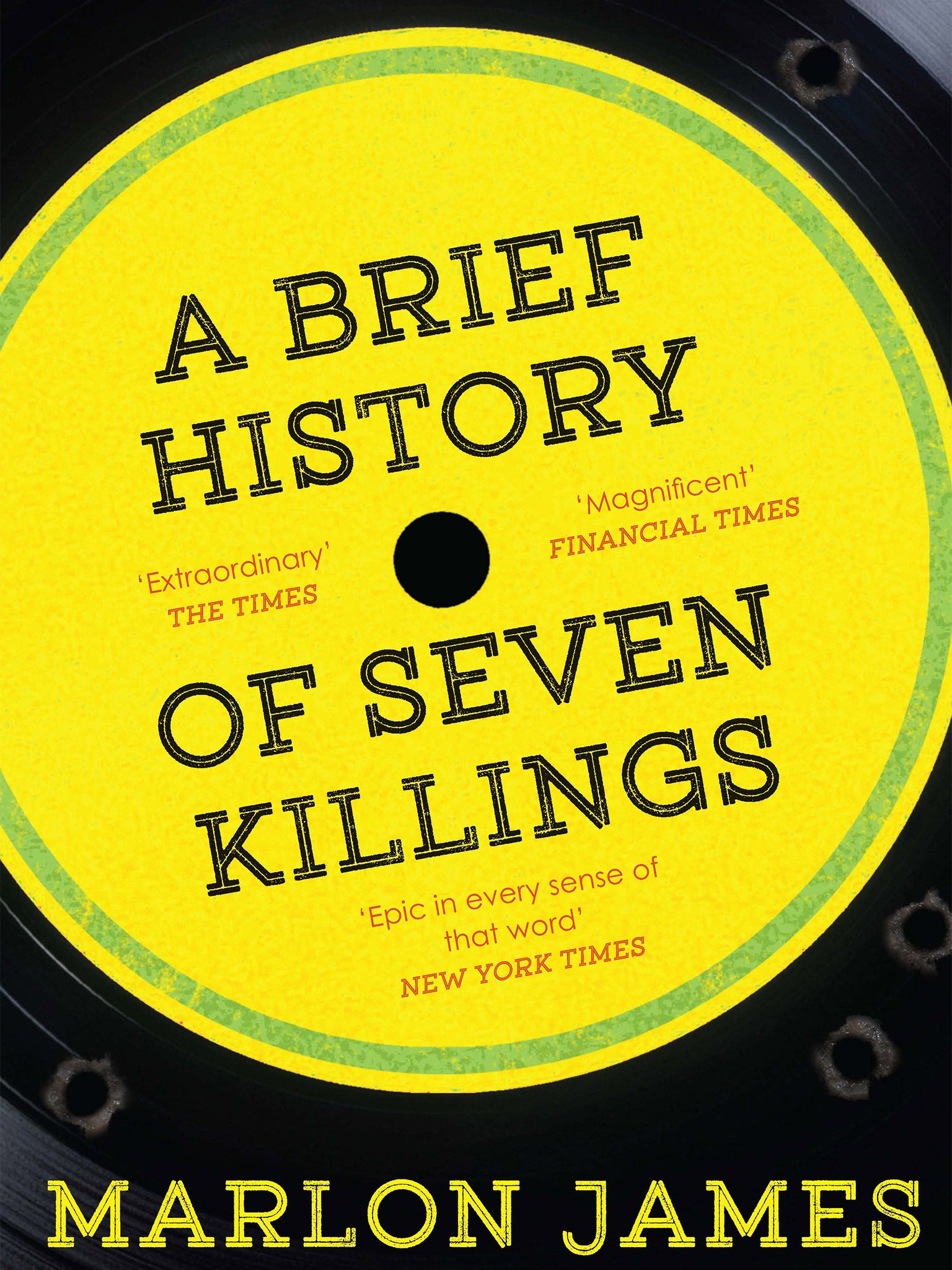Marlon James: 'I don’t believe in PG violence’
The 2015 Booker Prize winner Marlon James has been dubbed the literary Quentin Tarantino. He opens up about writing to shock, growing up gay in Jamaica and why there’s no such thing as the Great American Novel

Your support helps us to tell the story
From reproductive rights to climate change to Big Tech, The Independent is on the ground when the story is developing. Whether it's investigating the financials of Elon Musk's pro-Trump PAC or producing our latest documentary, 'The A Word', which shines a light on the American women fighting for reproductive rights, we know how important it is to parse out the facts from the messaging.
At such a critical moment in US history, we need reporters on the ground. Your donation allows us to keep sending journalists to speak to both sides of the story.
The Independent is trusted by Americans across the entire political spectrum. And unlike many other quality news outlets, we choose not to lock Americans out of our reporting and analysis with paywalls. We believe quality journalism should be available to everyone, paid for by those who can afford it.
Your support makes all the difference.Marlon James looks only slightly changed since being garlanded a Man Booker prize winner. I sat next to him at the prize dinner, when he seemed surprisingly relaxed, given the pressure, and surprisingly open too, with an air of gentle thoughtfulness that sat almost at odds with the machismo of his outer being: he is tall, dreadlocked, built.
His guard was down and his spirits high. He talked about growing up with a detective for a mother, a lawyer for a father and (thus?) his enduring love of James Ellroy; a first career in advertising (like Salman Rushdie and Don DeLillo); being a gay Jamaican and the ‘doubleness’ of that legacy, and a departure from his country of birth over seven years ago, at the age of 37, partly because of cultural taboos around homosexuality, but mostly for the good of his writing.
James, 44, has had two hours sleep since then, his voice is hoarse and he is nursing throat spray and a tube of lozenges. He is, as a result, the wearier version of himself from the previous night. The dust is still settling, he says, the Facebook messages are off-the-scale, the news feels unbelievable.
Some may say it is really not that unbelievable. He has already won the Anisfield-Wolf Award– sometimes called the Black Pulitzer – for this, his Man Booker prize-winning third novel, A Brief History of Seven Killings, which the judges revealed as their unanimous choice. It takes, as its creative pivot, the attempted assassination on Bob Marley’s life in December 1976 and incorporates a polyphonic cast of gangsters, journalists, drug-dons and ghetto dwellers, and two decades of their lives.
All three of his novels are optioned for screen adaptations, the most recent by HBO as a TV series, with which he has the most involvement. Who would be his dream casting in the series, I ask him. Idris Alba for the gangster, Josey Wales, of course. Naomi Harris for the female lead, Nina Burgess, perhaps. And for the gangland don, Papa-Lo, “a black version of Timothy Spall”.
He writes partly or entirely in Jamaican patois, and all his fiction carries astonishing, and explicit, displays of violence and sex, so much so that A Brief History of Seven Killings has earned comparisons with the films of Quentin Tarantino. James puts the record straight - “I was not inspired by Tarantino but by David Cronenberg – A History of Violence, Eastern Promises – that unforgettable sauna scene!”
It could be tempting to elide James’s fictional ‘ghetto grit’ with autobiography but it would also be wrong. He comes from a middle-class Kingston family of eight children and read English literature at university; his father who died in 2012 was first a policeman before becoming a lawyer and passed on his love of Shakespeare and Coleridge to his son. But it was his mother who gave him his first prose book (a collection of O.Henry stories), and he name-checks her often enough to reveal his enduring admiration.
Why, I ask him, did he choose to locate this book in Jamaica’s past, and not the country he knows it to be today. “Well, I wasn’t interested in writing about contemporary Jamaica. I was interested in the 70s and 80s. And I have not lived there for some years. I left when I was 37.”
Why he left, or partly why, was documented in an authored New York Times piece in March this year, in which he spoke of exile and sexuality. Being Jamaican and gay isn’t easy, he concedes, and it was a coming-out statement of sorts. “It wasn’t just sexuality [that made me leave] and I was way into the church [at that time] anyway. …But being a gay Jamaican… nothing happened to me but it could have.”
In his New York Times piece, he spoke of his schoolboy posturing as heterosexual, more for survival than out of any other calculation. What legacy does that leave on the soul? “A legacy of doubleness, of always performing. I used to talk about the different versions of myself, and then the instances when these two versions would collide.”
He talks of the glass closet – being ‘out’ to the people that matter, and I wonder, even now, if he considers himself fully out? “I know a lot of Jamaicans, Nigerians, Indians, Pakistanis, who cannot be out. They are out to their friends and in relationships but not to family, and not to the country. I don’t know if I’m out in Jamaica…. I don’t make a big declaration of it. I don’t deny it.”

Sexuality wasn’t the only reason for leaving home, though. “Trying to be a living writer is harder there. Writers need community.” He found this collective support in Minnesota, where he got a job teaching at Macalester College eight years ago, tutoring for two thirds of the year and writing fiction for the rest.
It is a twist of fate though, that he is still writing, and not languishing in advertising. This, he reminded us in his winner’s speech, is the ten-year anniversary of his first novel, John Crow’s Devil (to be published in the UK this autumn) which he originally threw away because it was rejected by publishers 78 times, and “I got tired of the rejections. I assumed it was because I hadn’t written a good novel. So I deleted it and thought ‘I’m done with fiction’.”
Thank God for his Outlook Express’s ‘outbox’ where the deleted manuscript lay and was retrieved after Kaylie Jones, a writer visiting Jamaica, encouraged him to show it to her and then edited it for free.
Ten years on, there is a body of work with a distinctive voice, experiments in form and a boldness that is refreshing. It doesn’t come without its controversies and Tarantino comparisons, but James insists that violence, and sex for that matter, is necessity for his fiction.
“I think violence should be written the same way I believe explicit sex should be written. Someone said to me that if I just show the desire, I wouldn’t have to write the sex. I thought ‘What do you mean? Is this your Anglo-Saxon puritanism speaking?’ Why can’t the visceral serve in fiction? Why sanitise a visceral experience?’
“I don’t believe in PG violence; neither do I believe in pornographic violence. If I have written ten episodes of violence, I have not failed if you are shocked every single time. But if by the fifth time you are desensitised, and then numbed, I have failed. It needs to shock you every time.”
We get onto the ‘whipping scene’ in Steve McQueen’s Oscar winning film, 12 Years a Slave, and the discomfort the vivid assault on a black slave by a white overseer aroused in its audience, as much for its aesthetics as its graphic cruelty. James has clear moral lines drawn around depictions of violent abuse and cruelty, and the collision with ‘beauty’, he thinks, can make a scene morally muddy. “As someone who writes a lot of cruelty, I think a whipping scene should never be beautiful.”
There are other forms of literary agitation in James’s work; Michael Wood, chair of the Man Booker judges, this week talked of ‘Englishes’ in fiction and James’s novels are best proof of this linguistic multiplicity within the English language. He has infused all of his books with Jamaican patois, including the latest, but it was his second novel, The Book of Night Women, written entirely in the18th century vernacular of a Jamaican slave girl, Lilith, which employed this to most stunning effect. Hers is a lyrical, hypnotic voice, and James never once takes the reader outside her head. He did not set out to write in this non-standardised way, though, and it was not an easy decision, especially, I imagine, when the early part of his literary education at school in Jamaica relied so faithfully on a white western canon. He admits it took him some time to release himself of the internalised prejudice against non-standardised English. Having done so, his books reveal its glory, grit and its poetry. “I had to get over my own low opinion of patois, of this idea of it as a broken language that needed fixing. I fought it nearly every step of the way with Lilith. It took me a while, but it was hard back then.”
If there is boldness in his work, it is there too in his critical assessments of the industry, and the literary establishment inside which he, however reluctantly, resides. He thinks it is Western myopia that leads some to think that fiction is in terrible straits, that the novel is over, “that the white middle-class men just aren’t writing” when the publishing industries in countries like Nigeria and India are thriving like never before. “I have a friend who is successful in Nigeria but has never been published in the UK, and doesn’t care.”
Another irritant is the idea of the Great American Novel, which not only implies that there is only one America, but exposes a deeper national insecurity, in his eyes. “I think the whole idea of the great American novel reflects the great inferiority complex of America. The idea that this should be something to strive for – the perfect form of a great novel and this idea of American exceptionalism – I feel like saying ‘dude, accept your penis size!”.
He would never want any of his books to be considered the Great Jamaican Novel. But neither would they be, in all likelihood. There is too much dissention and controversy around them. His detractors accuse him of “tearing down the country”. He was apprehensive about enlisting the narrative of American rap acts into his fiction, and had to negotiate the dividing lines between clear-eyed depictions and racial clichés in his decision to write about gangs, guns and ghettos in A Brief History of Seven Killings.
“I am tired of everyone talking about Jamaica as a country of ‘slums, ghettos, and violence’. But then here I was talking about Jamaica as ‘slums, ghettos, and violence’. The solution, I realised, was not to ignore all that but to complicate it, to make my characters three-dimensional and give them the capacity for change, even if that change, at the end of the day, might be for the worse.”
He is not about to mellow any time soon, either. He has already started researching his fourth novel, situated in an imaginary African country in the 12th century.
“Fantasy is my first love. My favourite fantasy book is Gormenghast. I recently got into an argument about whether there should be a black Hobbit. I get so tired of the argument that Lord of the Rings is a British story. This doesn’t have anything to do with it being a white story. I also feel like reminding people that it’s not real! You can do anything you want to it.
“In the end, I just thought ‘I’m done with this.’ I’m going into African - not European - mythology. And it’s going to be visceral, sexual.”
Of course it is.
Extract from ‘A Brief History of Seven Killings’
‘Bam Bam’

I know I was fourteen. That me know. I also know that too many people talk too much, especially the American, who never shut up, just switch to a laugh every time he talk ‘bout you, and it sound strange how he put your name beside people we never hear ‘bout, Allende Lumumba, a name that sound like a country that Kunta Kinte come from. The American, most of the time hide him eye with sunglasses like he is a preacher from America come to talk to black people. Him and the Cuban come sometimes together, sometimes on they own, and when one talk the other always quiet. The Cubans don’t f*** with guns because guns always need to be needed, him say.
And I know me used to sleep on a cot and I know that my mother was a whore and my father was the last good man in the ghetto. And I know we watched your big house on Hope Road for days now, and at one point you come talk to us like you was Jesus and we was Iscariot and you nod as if to say get on with your business and do what you have to do.
Join our commenting forum
Join thought-provoking conversations, follow other Independent readers and see their replies
Comments